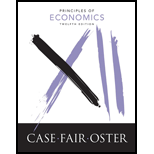
In which market Restaurant M falls according to its characteristics.
Answer to Problem 1.1P
The restaurant is in a
Explanation of Solution
The restaurant industry is a club of many firms serving varieties of foods. Each one tries to differentiate their cuisine through their unique foods. Restaurant M is famous for their Mexican food, especially for their unique margaritas and one-of-a-kind twists. The size of the market share owned by Restaurant M is way too small compared to the total size of the market. Thus, there is no domination by the firm in the market. Along with these characteristics, it is important to note that there are no barriers to entry and exit from the restaurant industry in the economy.
Thus, there is product differentiation in the industry. Also, there is freedom of entry and exit in the market and there is a large number of firms in the market. All these characteristics indicate that Restaurant M falls under the monopolistically competitive market.
Market: A market is a place where the buyers and sellers interact with each other and the exchange of goods and services takes place between them at a mutually agreed price level.
Monopolistic competition: The monopolistic competition is a market structure where there is a large number of buyers and sellers in the economy, and there is product differentiation in the economy as well as freedom of entry and exit into the market.
Want to see more full solutions like this?
Chapter 15 Solutions
Principles of Economics (12th Edition)
- how commond economies relate to principle Of Economics ?arrow_forwardCritically analyse the five (5) characteristics of Ubuntu and provide examples of how they apply to the National Health Insurance (NHI) in South Africa.arrow_forwardCritically analyse the five (5) characteristics of Ubuntu and provide examples of how they apply to the National Health Insurance (NHI) in South Africa.arrow_forward
- Outline the nine (9) consumer rights as specified in the Consumer Rights Act in South Africa.arrow_forwardIn what ways could you show the attractiveness of Philippines in the form of videos/campaigns to foreign investors? Cite 10 examples.arrow_forwardExplain the following terms and provide an example for each term: • Corruption • Fraud • Briberyarrow_forward
- In what ways could you show the attractiveness of a country in the form of videos/campaigns?arrow_forwardWith the VBS scenario in mind, debate with your own words the view that stakeholders are the primary reason why business ethics must be implemented.arrow_forwardThe unethical decisions taken by the VBS management affected the lives of many of their clients who trusted their business and services You are appointed as an ethics officer at Tyme Bank. Advise the management regarding the role of legislation in South Africa in providing the legal framework for business operations.arrow_forward
 Exploring EconomicsEconomicsISBN:9781544336329Author:Robert L. SextonPublisher:SAGE Publications, Inc
Exploring EconomicsEconomicsISBN:9781544336329Author:Robert L. SextonPublisher:SAGE Publications, Inc
 Economics (MindTap Course List)EconomicsISBN:9781337617383Author:Roger A. ArnoldPublisher:Cengage Learning
Economics (MindTap Course List)EconomicsISBN:9781337617383Author:Roger A. ArnoldPublisher:Cengage Learning
 Microeconomics: Private and Public Choice (MindTa...EconomicsISBN:9781305506893Author:James D. Gwartney, Richard L. Stroup, Russell S. Sobel, David A. MacphersonPublisher:Cengage Learning
Microeconomics: Private and Public Choice (MindTa...EconomicsISBN:9781305506893Author:James D. Gwartney, Richard L. Stroup, Russell S. Sobel, David A. MacphersonPublisher:Cengage Learning Economics: Private and Public Choice (MindTap Cou...EconomicsISBN:9781305506725Author:James D. Gwartney, Richard L. Stroup, Russell S. Sobel, David A. MacphersonPublisher:Cengage Learning
Economics: Private and Public Choice (MindTap Cou...EconomicsISBN:9781305506725Author:James D. Gwartney, Richard L. Stroup, Russell S. Sobel, David A. MacphersonPublisher:Cengage Learning





